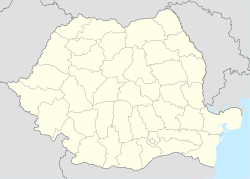Tărhăuși
|
Ghimeș-Făget Gyimesbükk |
|
|---|---|
| Commune | |
 |
|
| Coordinates: 46°35′N 26°4′E / 46.583°N 26.067°E | |
| Country |
|
| County | Bacău County |
| Area | 184.85 km2 (71.37 sq mi) |
| Elevation | 745 m (2,444 ft) |
| Population (2002) | 5,340 |
| • Density | 28/km2 (70/sq mi) |
| Ethnicity | |
| • Hungarians | 50.93% |
| • Romanians | 47.22% |
| • Csangos | 1.32% |
| Language | |
| • Hungarian | 57.50% |
| • Romanian | 42.39% |
| Time zone | EET (UTC+2) |
| • Summer (DST) | EEST (UTC+3) |
| Postal Code | 607205 |
| Area code(s) | +40 234 |
Ghimeș-Făget (Hungarian: Gyimesbükk, Hungarian pronunciation: [ˈɟimɛʃbykk] or sometimes Nagy-Gyimes) is a commune in Bacău County, Romania. It is the only commune in the county that lies in the historical region of Transylvania.
The commune, the seat of which is Făget village, is composed of six villages:
The village was part of the Székely Land region of the historical Transylvania province. It was first mentioned in 1600 as Gijmes. The area of the commune belonged to Csíkszék until the administrative reform of Transylvania in 1876, when it fell within the Csík County of the Kingdom of Hungary.
The village was occupied by the Romanian army between 13 and 20 November 1918. Shortly thereafter, the Union of Transylvania with Romania was proclaimed, and the village, like the rest of Transylvania, formally passed with the Treaty of Trianon from Hungarian to Romanian control in 1920. In 1940, the Second Vienna Award granted Northern Transylvania to Hungary and the village was held by Hungary until 1944. With the Soviet occupation near the end of World War II, the Romanian administration returned and the commune's status as part of Romania was formalized in 1947.
Until 1918, it was a border village between Hungary and Romania and as such, it had an important and large railway station designed by Hungarian architect Ferenc Pfaff. The main building of the station was 102m long and 13m wide, comparable in size and elegance with the railway stations of Szeged and Fiume.
...
Wikipedia

